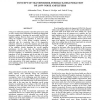Free Online Productivity Tools
i2Speak
i2Symbol
i2OCR
iTex2Img
iWeb2Print
iWeb2Shot
i2Type
iPdf2Split
iPdf2Merge
i2Bopomofo
i2Arabic
i2Style
i2Image
i2PDF
iLatex2Rtf
Sci2ools
ISCAS
2003
IEEE
2003
IEEE
Concept of transformer-feedback degeneration of low-noise amplifiers
Owing to its well-known properties of possible power-noise match as well as superior noise performance, the inductively-degenerated low-noise amplifier is nowadays the most-widely used RF preamplifier topology. However, there is not much flexibility when setting the amplifier’s input impedance to match the source impedance, as for a given biasing condition, matching is achievable only for a particular value of the degenerative inductance. Moreover, to cancel the imaginary part of the input impedance, a particular excess inductance is necessary at the input of the amplifier, directly degrading the over-all amplifier performance. On the other hand, the transformer-feedback degeneration, introduced in this paper, offers the possibility, for low-noise amplifiers, of simultaneous matching to the source impedance of both the imaginary and the real part of the input impedance, in an orthogonal way. What is more, by controlling the amount of feedback, the amplifier is relieved from the burd...
| Added | 04 Jul 2010 |
| Updated | 04 Jul 2010 |
| Type | Conference |
| Year | 2003 |
| Where | ISCAS |
| Authors | Aleksandar Tasic, Wouter A. Serdijn, John R. Long |
Comments (0)

